- Home
- Adam Thorpe
No Telling Page 14
No Telling Read online
Page 14
‘Concentrate,’ growled my uncle, although she wasn’t navigating.
‘I built it,’ said Khaled.
No one said anything.
My uncle had to drive slowly because of the mobilette sticking out of the boot, the boot’s lid banging on the wheel when we hit a bump. People looked at us but in a different way, as if we were no longer a threat. It was as if Khaled had camouflaged us with a magic cloth, and I felt almost proud, fantasising that this Khaled was my older brother and knew everything and that we were not strangers here but known and liked. He kept chatting quietly as he showed us the way, casting the same magic spell over my mother and my uncle, who were nodding and listening. By the end we knew he wanted to work on the railways and was studying for a diploma at night, that he came from a large industrial town in Algeria and that his father was dead and that he had six brothers and one sister. After about a quarter of an hour we arrived at the start of the road which, he said, was the right one for Bagneux. I thought I recognised its line of bare trees and the mess of flats and warehouses and wooden fences either side.
‘Don’t you need to be taken back?’ my mother asked.
‘Don’t worry, madame,’ said Khaled, politely. ‘It’s my day off.’
‘But it’s a long way, isn’t it? Give him some money, Alain.’
‘Please don’t worry. I like to help strangers in trouble. That’s my religion.’
‘Like ours,’ said my mother, as if he had doubted this.
‘If a man is dying of thirst in the desert,’ Khaled went on, his hand on his chest, ‘you get joy in your heart from sharing your water with him.’
‘Like the Good Samaritan,’ said my mother.
‘I’m thirsty,’ I said.
My mother snorted. ‘He doesn’t mean it literally, dear,’ she said.
‘Are you thirsty?’ Khaled asked me.
‘Yes,’ I said. ‘Very.’ My mouth was so dry it crackled, and a sickly headache was prowling above my nose.
He took my hand and squeezed it. ‘Wait there, Gilles.’
He got out of the car and ran back up the road. My uncle said, ‘Now he’s going to get his mates.’
‘What do you mean?’ said my mother.
‘He’s going to get his mates as back-up and demand a fee for his trouble. Or worse. Arabs don’t do things for free, you know.’
‘Let’s just go, then,’ said my mother, nervously.
‘His doggy-basket on wheels is still in the back.’
‘You can’t just go,’ I said. ‘He’s getting me something to drink.’
‘If you’d drunk in the hospital,’ said my mother, twisting around and glaring at me, her black wig crooked on her forehead, ‘we wouldn’t be in this mess.’
‘It’s not a mess,’ I replied, ‘and it’s got nothing to do with that.’
I felt they were mean and cheap, suddenly. They had cheapened themselves with their meanness. It was a strange moment for me, feeling this. My uncle was lighting a cigarette, bent over the leather-skin lighter as if in a wind.
‘The point is,’ he said, his mouth all distorted as he drew hard on the cigarette, ‘you can never be sure.’
‘Sure of what?’ my mother snapped.
‘What we think of as truth isn’t truth to the Arabs. It’s a different culture. Like never eating with their left hand.’ He turned to me, smoke coiling up into his hair, a grin on his face. ‘Know why Arabs never touch food with their left hand, do you, chum?’
I shook my head. He was watching me in the mirror, now. It was obviously a joke, like the jokes he’d crack with managers in their offices over a drink.
‘Please, Alain,’ said my mother. ‘That’s enough.’
He looked at her, sharply, even violently.
‘You don’t know what they did when one of us blokes fell into their hands,’ he said, his deep voice trembling.
There was a tap-tap on the rear window, by my ear. It was Khaled, with a bottle of mineral water. He was out of breath from running. He had run all the way to a friend’s shop two streets away. As I drank the water, standing outside the car and gulping it down, my uncle tried to pay him, but Khaled refused.
‘Don’t worry, it didn’t exactly cost a lot,’ he laughed.
‘No, but it’s the principle,’ my uncle mumbled.
He helped Khaled extract the mobilette from the boot. Khaled stuck out his hand. My uncle hesitated before taking it.
‘Thanks,’ he said, flatly.
Khaled shook my hand, too, calling me Gilles as if he’d known me for ages, and I thanked him with the feeling that was missing from my uncle’s voice. It must have sounded ridiculous. Then Khaled walked away, his mobilette squeaking next to him with the chain dangling.
He’s the angel, I thought. Of course. I should have asked him about Nicolas. I should have asked him to cure my sister.
It was very hard for me to button my lip on the rest of the drive back. My mother and uncle made comments about the ‘sickly’ scent, about the ‘cheek’ of him getting into the car uninvited, about the ‘likely tale’ of his cousin’s shop and the fact that he would ‘certainly’ have had a knife. By the end, Khaled had got a free lift and nicked the mineral water and it was lucky we three were still alive.
‘In fact, they fill the bottles with tap water and charge you a fortune. And every two minutes there’s another one, brand-new,’ declared my uncle, as we drew up in front of the house. ‘And I’m not talking about bottles of water.’
‘Two and a half minutes, you told us,’ I said, in a tired sort of way, as if I was sick of him.
They laughed. They found it funny. Like the story of me pointing to a building site years before and saying, ‘That’s Egypt.’
7
I talked about Carole dancing in the nude to Christophe, after catechism. We were sitting under one of the pine-trees in our secret place, the ground soft and tickly with needles.
‘Was she wearing her slip or anything?’ he asked, jabbing at the ground with a stick.
‘No.’
‘Why did she go bonkers, anyway?’
‘She’s not bonkers. She’s got nervous problems.’
‘Is she in a lunatic asylum?’
‘She’s not gone bonkers. She’s just in a special ward for people with nervous problems. Hôpital Foch.’
He didn’t say anything, just kept tearing up the ground with his stick. The soft stuff kept tearing and flying through the air, as if bullets were hitting it. I had a sudden weird feeling that I’d remember this moment when I was old, that it would stick in my head like a film or a photograph when most other moments had been forgotten.
‘Maybe she saw something,’ he said. ‘My grandma’s aunt, she saw something.’
‘She went bonkers?’
‘No, just “nervous problems”,’ he chuckled, imitating my voice.
‘What did she see?’
‘She saw her husband come back from the war.’
‘What, all smashed up?’
‘No,’ said Christophe, ‘he had this big bandage on his head. Really huge white bandage, see. Like a turban. He’d been away for a long time and he came up the road and she was in the garden. She looked up and saw him and the shock made her go bonkers.’
‘What, just the white bandage on his head?’
‘He should have warned her,’ Christophe said. ‘He probably wanted to give her a nice surprise. They’d only just got married when he went off to fight. Then she looked up and saw this bloke all thin with this stupid great bandage on his head, probably covered in blood.’
Christophe was very serious when he was telling it, as if he was someone else.
‘How did she seem bonkers?’
‘She just never talked, never again. She just picked flowers.’
‘Picked flowers?’
‘I dunno. Singing, in the fields. Just to herself. Picking flowers and singing all the time but not very loud. I dunno. Just picking flowers and singing. It’s just what my grandma ke
pt telling me before she stopped talking as well.’
He shrugged.
‘When was it?’
‘About a hundred years ago. After Verdun or something.’
‘Not Verdun. That was in 1914, about. Fifty years ago.’
‘I dunno. It wasn’t fifty years ago because she kicked the bucket in 1901. It says it on the grave.’
‘Maybe Sedan.’
‘Eh?’
‘Sedan. The battle.’
Christophe looked at me, frowning. I felt bad, saying it as if he was stupid not knowing. I didn’t let on, though, that Jonquille had only just taught us about Sedan.
‘We lost it. It was in 1870. Our cavalry got completely smashed up by the Germans. They kept galloping out and the Germans’ guns just blasted them to bits. We were really heroic but the stupid Emperor put a white flag up and this general said that we were stuck in a chamber-pot and were going to be shat on. That was just before the battle because the whole French army was stuck in this town, and they had a big ball with all the wives dressing up and looking beautiful.’
Christophe started to imitate cannons firing and shells exploding, but quietly and just with his mouth. He was staring in front of him as if he could see it: the shells whistling down and exploding and the horses rearing up and the men with plumes on their helmets falling off with their arms spread out. I started to do the screams and cries, but just as quietly. It was very realistic: I could see the whole thing happening in front of me, almost as if I’d been in it myself. Then Christophe stopped.
‘Yeah, it was that place, what you said.’
‘Sedan.’
‘Yeah. He was wounded there and then he was a prisoner in Germany.’
‘Like those soldiers in the photograph of here.’
‘Yeah. I dunno.’
‘It was. It was the same war.’
‘We’re always getting smashed up, in fact.’
‘I wouldn’t want to be German, though. Not for real.’
‘American?’
I shrugged, pouting my lips. I wasn’t really sure about that. I wouldn’t have minded being born somewhere you got Coca-Cola in a big paper cup full to the brim with smashed ice.
‘The Germans got smashed up twice,’ Christophe said.
‘In the end, yeah.’
We sat quietly, the conversation making us feel older, even wise. Christophe made a few gunshots quietly in his mouth, staring past the tree. I pictured the photograph in my head. It was as if we were in the way of the soldiers, suddenly. As if one of them might trip over us as he limped past on his sticks.
‘I don’t think Carole saw anything,’ I said. ‘Anyway, she’s not bonkers.’
‘If I saw a ghost, I think I’d go bonkers,’ said Christophe. ‘Your hair can go white. Mamie’s aunt probably thought her hubby was a ghost, that’s what I reckon.’
He leapt up, suddenly, and went stiff, his face all twisted with terror.
‘Beautiful,’ I said.
He collapsed onto his back, pretending to be dead.
‘Did she have glitter on her titties?’ he asked, only his lips moving. ‘That’s what they have in floor shows.’
‘How do you know?’
‘Seen ’em,’ he said.
‘Really?’
‘Yeah. They show their bottoms.’ He opened his eyes and put his hands behind his head, stretching out. He yawned. ‘They take their knickers off slowly and bend over and all these blokes are staring at them like they’re watching their mum darning socks. Really big fat bums as soft and white as dough, Gilles.’
Something in the way he was saying it made me wonder if he wasn’t copying this information from an adult.
‘You haven’t been to one. You’re too young.’
‘It’s really bad light. They can’t tell as long as you keep your mouth shut.’
He stood up, wriggling about.
‘You can touch ’em, their big arses. They sort of hang down like melons and you can touch ’em. Imagine actually touching them.’
‘OK.’
I’d heard his voice crack into a falsetto, as if under pressure.
‘Not to mention—’
‘OK!’
He paused, frowning, his hands around invisible bosoms on his chest.
‘Don’t you like girls, Gilles?’
‘Don’t be stupid. It’s just boring, because you don’t know.’
‘Oh,’ he simpered, flapping a hand up and down like a broken wing, ‘you’re so heartless, dearie.’
I threw a pine-cone at him and then we kicked at a tree, seeing if we could make the pine-cones fall just by the vibrations. Christophe told me about his father cutting huge pine-trees in Germany, during the war.
‘He was in this camp,’ he said. ‘It was freezing cold and he and this other bloke had to saw down these huge bloody great trees, and they had to do two a day. Or maybe it was twenty. And they lived in this hut and the other bloke died of pneumonia, but my dad didn’t.’
‘Obviously not.’
He threw a stick into the branches and a pine-cone fell between us, a smooth, shiny one. I picked it up. It was sticky and smelt of resin.
‘And my uncle had to pick potatoes,’ Christophe went on, kicking at the tree with his hands on its trunk. ‘And he was beaten up by this German guard for putting a few in his pocket, because it was just disgusting soup otherwise.’
I was breathing in the delicious scent of the pine-cone, but it was getting less, like something just round the corner.
‘What did your dad do?’ asked Christophe, kicking at an old pine-cone that rustled as it rolled.
‘Which one?’
‘Well, your real one.’
‘Dunno. He was too young, anyway.’
‘And your uncle?’
‘Even younger, obviously. They were still at school. They got kicked out of the house by the Germans and had to stay with a relative in St Ouen. Maybe our house was used to torture people.’
‘Yeah.’
I felt unlucky, not to have had a dad who’d done something heroic. The resin on my hands was impossible to get off. I smelt my fingers.
‘My mum had to learn German at primary school—’
‘My dad speaks it, and my uncle. With a Silesian accent.’
‘Where’s Silesia?’
‘In Germany, I suppose. Or in Russia, now, maybe. I dunno. A bloody long way away, anyway.’
He threw the stick again into the tree and a pine-cone fell and bounced off my shoulder, hitting my ear on the way.
‘Shit!’
I kicked the tree-trunk so hard that my boot had a dent in the toe.
We held competitions, seeing how far we could rock the Gestapo sidecar before falling over or the time was up. Christophe rolled around pretending to be tortured for a bit and then left at three o’clock to help his father with the meat. The buzz of his mobilette died away quickly, leaving me alone with the side-car.
I rocked in it, thinking about Carole. I thought about her telling me bedtime stories when I was small, before and after our father died. One of my favourites was called The Ant.
This ant called Jules was walking along in the middle of Bagneux on the way to visit its brother and was just about to be stepped on by a man crossing the road when the man saw it and stopped and a car swerved to avoid him and made an enormous lorry swerve which hit the church and the tower fell down onto the Thomson’s factory which blew up and a plane flying over was hit by a brick and crashed onto the Presidential palace in the middle of Paris and war was declared against the Russians and everything ended in lots of nuclear explosions and that was the end of the world like it says in the Bible except for a warm rabbit burrow in the park at Sceaux where the Gobain family lived happily ever after.
‘All because,’ she would always say, putting her face very close to mine and tapping the tip of my nose, ‘a little ant decided to see its brother.’
‘Carole has gone funny because,’ I murmured to myself, rocking in th
e Gestapo side-car, ‘our father slipped on a wet floor.’
I pretended I was rowing the side-car over a huge sea. I wondered – for the first time, in fact – who had mopped the floor that day. It would have been Maman. Once a week she did it, now, with the giant mop like a long moustache. She must have blamed herself for my father’s death, however much it was an accident.
I tried to imagine life carrying on with my father alive – if he had slipped as I did, only cutting his forehead or getting a bruise. I saw a stiff shadow smelling of pipe tobacco, that became like one of those fathers in advertisements on television: I saw my uncle visiting now and again with his deep, booming voice and making us laugh and my mother not so anxious and no smell of drink and Carole happy and all of us going to see her at the Opéra, where she was the star. This last bit was difficult, very hazy, because I had never been to a ballet performance and had no idea what the Opéra looked like. All I saw, in fact, was Carole laughing and waving in bright lights, then dancing as she had done in the mental ward but with a costume on. I wasn’t even sure how exactly ballet dancers looked, beyond something that stuck out all round and was perhaps pink.
When I climbed out of the side-car, I was so stiff from the cold that I could hardly walk.
The next Saturday, my mother took me to the New Year sales in the centre of Paris. We did this every year. It was something I dreaded and then enjoyed – it usually ended in the covered archway by the Gare St-Lazare. The main model car and train shops were there, and I was always allowed to choose a new Dinky.
This was the one time in the year she visited the big department stores, so she dressed in posh clothes and got her hair done, splashing perfume on herself and painting her eyelashes. We floated through the stores like rich people, the background music stealing into your head without you knowing it; so did the smells in the perfume department and the busy voices and hands of the assistants and the accidental nudge of their knuckles on your private parts as they measured you for trousers.
‘Now they’d look nice on you.’
‘The latest thing,’ said the assistant, rubbing his hands.
They were bright blue corduroy and finished at my knees in thick turnups. They felt tight around my groin.

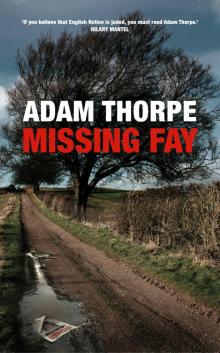 Missing Fay
Missing Fay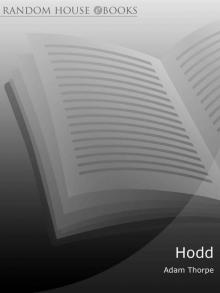 Hodd
Hodd Pieces of Light
Pieces of Light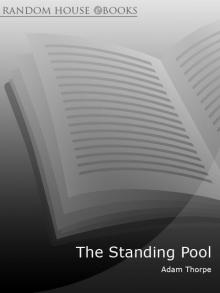 The Standing Pool
The Standing Pool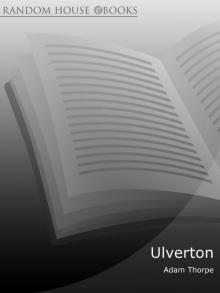 Ulverton
Ulverton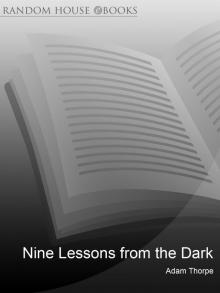 Nine Lessons From the Dark
Nine Lessons From the Dark Flight
Flight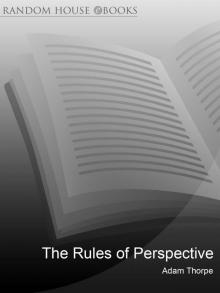 The Rules of Perspective
The Rules of Perspective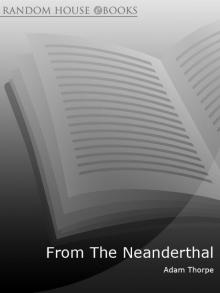 From the Neanderthal
From the Neanderthal Is This the Way You Said?
Is This the Way You Said?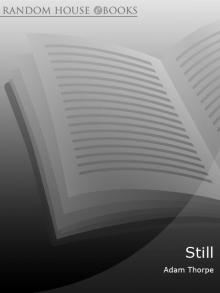 Still
Still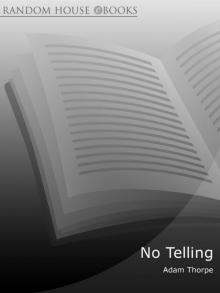 No Telling
No Telling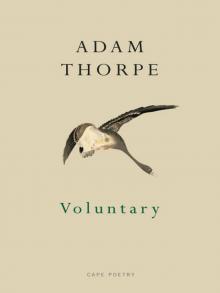 Voluntary
Voluntary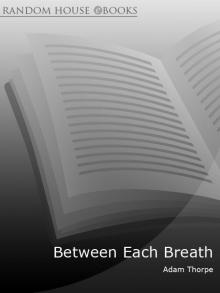 Between Each Breath
Between Each Breath